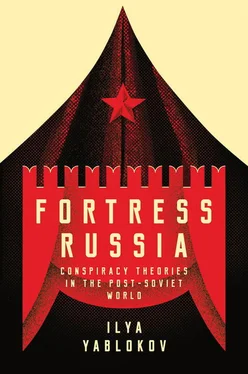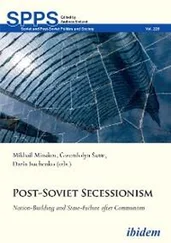The parliamentary elections of 2007 can be seen as a central episode in the political development of post-Soviet Russia, as they were harnessed to the task of achieving a smooth transfer of power from Putin to his chosen successor and legitimizing the political system over which he presided. As Duncan (2013) noted, uncertainty about the future created a sense of fear in the elites in Russia; and this fear was in part reflected in the proliferation of anti-Western conspiracy theories, which claimed that there was a subversive minority in the country which aimed to destroy the political and economic achievements of the 2000s.
After United Russia’s success in the December 2007 elections, the political establishment altered its overarching political narrative; instead of the threat of a ‘colour revolution’, the principal danger was the slow modernization of the economy. This became the central trope of Medvedev’s presidential term. According to Russian Newsweek, Medvedev personally removed all references to the Western threat of ‘colour revolution’ from his speech to a meeting of civil activists in January 2008, and focused instead on how to increase the socio-economic prosperity of the Russian people (Fishman et al., 2007, p. 17). This conceptual shift in Medvedev’s rhetoric suggested that anti-Western conspiracy notions were regarded by the political establishment as an efficient tool of popular mobilization, particularly during sensitive periods for the regime. The next electoral period, in 2011–12, again demonstrated that anti-Western conspiracy ideas could protect the regime at a critical time.
The White Ribbon Divides the Country
The major protest activity in the 2011–12 electoral period can be attributed largely to misjudgements on the part of the Kremlin. Lack of information and understanding about popular attitudes, and the conflicting signals sent by the Kremlin to local authorities about who will run again for the president’s office, allowed the opposition to seize their opportunity and organize what turned out to be the biggest rallies since the time of perestroika (Petrov, Lipman and Hale, 2014, pp. 17–18). At the beginning of the electoral campaign, the main goal of the pro-Kremlin narrative was to justify Putin’s return to presidential office for a third term. The official announcement that he was running for president again was made at the United Russia Party congress on 24 September 2011, when Medvedev announced that he would not be seeking a second term himself. Referred to by the Russian media as a reshuffle ( rokirovka ), this swap resulted in disillusionment among many Russians and provoked criticism in the independent media about Medvedev as a politician. In the run-up to the elections, liberal journalists argued that Putin would have a hard time explaining to ordinary Russians why he was returning to the Kremlin, and justifying Medvedev’s decision not to seek re-election. Putin failed to resolve these issues during the campaign (Kamyshev, 2011).
On 20 November 2011, at the Mixed Martial Arts Tournament, Putin was booed by the crowd. High-ranking supporters, including his press secretary, Dmitrii Peskov, tried to account for the crowd’s reaction, making out that it was the defeated foreign fighter who was booed (Kates, 2011). Nevertheless, the incident demonstrated the fact that Putin was having difficulties in achieving wide public support. This caused a dramatic shift in the campaign strategy (Kukolevskii, 2011), which revived the conspiratorial concepts which had been used in the previous electoral campaign.
As early as 27 November, at the United Russia Party conference, Putin stated: ‘We know… that representatives of some foreign countries are gathering those they are paying money to, so-called grant recipients, to instruct them and assign work to influence the election campaign themselves’ (Bryanski and Grove, 2011). In this way, Putin and other members of the Russian political establishment attempted to delegitimize the activities of NGOs on the eve of the elections and make the results of alternative polls and monitoring vulnerable to criticism. Yet genuine non-biased monitoring would have demonstrated massive fraud and violations of the law.
These pronouncements were backed by a clear increase in the dissemination of anti-Western conspiracy ideas by the Russian media. The NTV television channel made a documentary about the Association in Defence of Voters’ Rights, ‘Golos’, which would later be nicknamed Golos niotkuda ( The Voice from Nowhere ). The programme was broadcast on prime-time television on the eve of the elections (CHP. Rassledovanie: Golos niotkuda, 2011). The filmmakers, from a special NTV department which had been created specifically to produce this kind of mudslinging (Afisha, 2012), claimed that Golos was affiliated with foreign sponsors, and that it received funding precisely to bring about Russia’s collapse by claiming that the 2011 parliamentary elections had been rigged. This story was followed by the closing down of the Karta narushenii ( The Map of Violations ) project, produced by Golos in collaboration with the news website Gazeta.ru to monitor the quantity and specific details of violations during the parliamentary elections (Sidorenko, 2011).
At the same time, Anton Beliakov, a Duma deputy from the pro-Kremlin A Just Russia Party, stated that the USA, as Russia’s geopolitical opponent, had financed Golos for the purpose of demonizing and undermining the country’s reputation, and so damaging her investment climate (Makeeva, 2011). Beliakov and his Duma colleagues filed an inquiry at the General Prosecutor’s Office to check if Golos’ intervention in the electoral process had been carried out in the interests of foreign countries (Bashlykova, 2011). Nikolai Levichev, the head of A Just Russia, also accused Golos of being a ‘puppet master’ ( kuklovod ) with ‘messianic’ aspirations to influence the results of the elections ( Gazeta.ru, 2011).
This joint attempt by television channels and politicians to link Golos with ‘foreign masters’ served to throw both its reputation, and the results of the monitoring of the elections, into doubt. Although the organization disclosed all the necessary information about its funding, the conspiratorial narrative, disseminated through the mainstream media during the parliamentary election campaign, described Golos as an important tool of foreign influence on domestic politics. In the first decade of December, during the street rallies protesting the rigging of the election results, the following appeared on the pro-Kremlin website Vzgliad:
‘Golos’ became ‘the entry point’ for ‘Western partners’ into Russian domestic politics; precisely through this association pressure was applied which eventually brought about a situation whereby today the non-systemic opposition claims the illegitimacy of the Russian elections and ineffectively tries to protest in the streets against their results. (Afanas’eva, 2011)
The political establishment feared a loss of legitimacy during the process of the transition of power, and tried to pre-empt this by means of conspiratorial narratives about Golos. This was the same method that had been used against OSCE observers in 2007. Before the parliamentary elections, some experts decided that there would be more evidence of political manipulation in these elections than had been the case in the previous ones, and that this would pose a threat to the political legitimacy of the United Russia Party and Putin himself (Belanovsky and Dmitriev, 2011). With public support for Putin lower than it had been in the 2000s, and the Kremlin unable to offer the public a sufficiently good reason to return Putin to the presidency, pro-Kremlin politicians and spin doctors were very keen to utilize the old tactics. Through active use of the media they attempted to mobilize ‘the people’ against the pro-Western ‘Other’, which made independent observers of the elections the first, and most vulnerable, target, just as they had been in the 2007 parliamentary elections.
Читать дальше
Конец ознакомительного отрывка
Купить книгу












